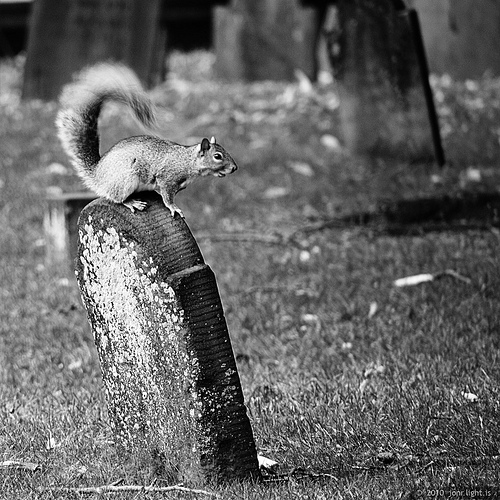When I was about four years old, a squirrel found its way into our house. My dad and his brother pursued it while my mom and I cowered in the bathtub with the shower curtain drawn. Eventually one of the men killed it with a hammer. I don’t remember seeing the corpse, but I have a vague memory of bloody kitchen towels.
Awful, isn’t it. But don’t be too alarmed. Chances are this massacre never happened. My parents have no memory of the incident, and killing a small animal with a blunt object seems like something that would stick. I might have made the whole thing up.
A memory is a slippery thing to define. Roughly it’s a particular pattern of neurons that tend to fire together. “It’s the combination that’s important,” Todd Sacktor told me when I spoke with him in 2012. Memories appear to be fixed, but they are surprisingly malleable — less like stone tablets and more like pencil sketches. Many researchers now believe that the simple act of recalling a memory opens it up to alteration.
Memories can also be fabricated. In his childhood memoir, Uncle Tungsten, Oliver Sacks describes witnessing two bombings while growing up in London during WWII. He later discovered that he only witnessed one attack. Sacks assumes he cobbled the other memory together after reading a letter from his brother that contained a particularly vivid account of the event. “All of us ‘transfer’ experiences to some extent, and at times we are not sure whether an experience was something we were told or read about, even dreamed about, or something that actually happened to us,” Sacks writes. “This is especially apt to happen with very early experiences, with one’s so-called ‘earliest memories.'”
But Sacks’ recollection depicts an event that actually happened. My memory depicts an event that appears to have been conjured from thin air. That too seems possible under the right conditions.
Elizabeth Loftus* has made a career of sowing false memories. She has planted all sorts of experiences in the minds of her study participants — being lost in a shopping mall, breaking a window, visiting Disney World and shaking hands with Bugs Bunny, and –- most improbably — witnessing a demonic possession. One aim was to show that eyewitness accounts can be inaccurate. However, her studies also provide some insight into how fake memories arise.
“Collectively, researchers have learned a great deal about how false memories develop and are almost at the point of being able to write a recipe. First, the individual gets convinced that the false event is plausible. Even events that start out being rather implausible can be made to seem more plausible by simple suggestion. Next, the individual gets convinced that the false event was personally experienced. Plying the person with false feedback is a particularly effective way to accomplish this. At this point, the individual might merely believe that the event is true but have no sense of recollection. But with guided imagination, with visualization of the stories of others, and with suggestive feedback and other sorts of manipulations, a rich false memory can develop,” Loftus writes (PDF).
That’s a great explanation of why Loftus’ methods are successful, but it doesn’t explain how my false memory arose seemingly spontaneously.
Did I dream the event? Is it possible there’s some underlying grain of truth? Surely my dad had a hammer. And my grandma once had squirrels in her attic (unless that too is a false memory — perhaps all my false memories contain squirrels!).
It’s also possible I’m fusing real events with experiences I only heard or read about. My husband once told a funny story about a friend of a friend who put a personal ad in the paper only to have his own wife respond. “That sounds a lot like the piña colada song,” I said. “Oh yeah,” he responded. “That’s the piña colada song.” Either way it’s a good story.
**
Image courtesy of Jon Ragnarsson
*Read William Saletan’s detailed profile of Loftus and her work here.

Cassie’s story reminds me of a This American Life episode in which Robert Krulwich and his wife Tamar argue about which one of them saw Jackie O.
Seems our spouses always get the story wrong.
http://www.thisamericanlife.org/radio-archives/episode/226/reruns?act=2
Cassie’s story also reminds me of a This American Life episode: Squirrel Cop.
http://www.thisamericanlife.org/radio-archives/episode/115/first-day
Well, Christie, I guess that puts me in the Robert Krulwich category… Trying to figure out how I feel about that.